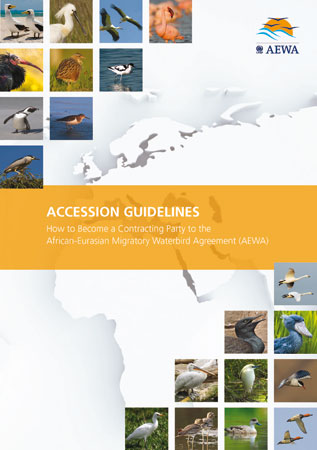Who can become a Party and how?
Since the day of its entry into force, all non-signatory range states can become Parties to the Agreement through accession. Accession is the act whereby a state undertakes to become a party to a treaty already negotiated and signed by other states, but which, after a certain date, has been closed for signature. The deposit of the relevant instruments with the depositary binds the State concerned at international law.
Steps to become a Party
Step 1. Preliminary consultations and documentation:
In order to involve all government stakeholders at an early stage, an inter-ministerial committee can be set up to ensure an efficient consultation process. In consultation with other ministries involved, (e.g. the ministry of finance, agriculture etc.), the competent authority for the implementation of the Agreement, usually the ministry of environment, may wish to prepare a document concerning the implications of accession to AEWA. The document should address, among other issues, the administrative and legislative framework necessary for implementing AEWA, the need for new laws, as well as a cost-benefit analysis of becoming a Party to AEWA. This document can be used as an informative basis for the decision regarding accession to AEWA.
Step 2. The national decision-making process:
Assuming that there is the political will to proceed, the lead authority then consults with the Government authority responsible for drafting ratification instruments for international agreements, normally a legal unit within the ministry of foreign affairs. This responsible authority identifies who at the national level should, as a rule, take a decision on or approve accession to the Agreement. The decision-making authority indicates the necessary documentation and decision-making processes that need to be completed before the instrument can be signed and deposited. In addition to obtaining the necessary approval within the administration of the head of State or head of Government, or by parliamentary debate, such processes may include new legislation, a judicial review, or evaluation at different state levels.
Reservations at the time of accession: A reservation is a formal declaration by a State, at the time it takes the action required to become a party to a treaty, announcing that it does not consider itself bound by some of the treaty’s provisions. A reservation may enable a State to participate in a multilateral treaty in which it would otherwise be unwilling or unable to participate. AEWA’s provisions are not subject to general reservations. However, specific reservations may be entered on depositing the instrument of accession in respect of any species covered by the Agreement or any specific provision of the Action Plan. Such a reservation can be withdrawn at any time by notification in writing to the Depositary.
Step 3. Preparing and signing instrument(s):
Following the completion of the domestic legislative procedures, where necessary, for the approval of the Agreement, the Government office responsible for doing so prepares the instrument of accession and any instruments of declaration. In the practice of many countries, this responsibility lies with the ministry of foreign affairs. The instrument must be signed by the head of State, head of Government or minister of foreign affairs. A person other than the head of State, head of Government or minister of foreign affairs may sign a treaty only if that person possesses a valid instrument of full powers.
Step 4. Depositing the instrument of accession:
The instrument of accession to AEWA becomes effective only when it has been received by the Depositary, in the case of AEWA the Government of the Kingdom of the Netherlands. This is customarily done through the Ambassador of the relevant State to the Netherlands. Usually, the Ambassador (or Deputy) of the acceding country requests a meeting at the Ministry of Foreign Affairs of the Kingdom of the Netherlands and hands over the instrument of accession together with a note signed by him/herself. It is also possible to deposit the instrument of accession at the Embassy of the Kingdom of the Netherlands in the acceding country, or, if there is none in that country, at the Embassy closest to it. The Agreement enters into force for the acceding country on the first day of the third month following the deposit.
Information for submission of instruments:
Postal address:
The Ministry of Foreign Affairs of the Kingdom of the Netherlands
Legal Affairs Department
Treaties Division (DJZ/VE)
P.O. Box 20061
2500 EB The Hague
The Netherlands
Visiting address:
The Ministry of Foreign Affairs of the Kingdom of the Netherlands
Legal Affairs Department
Treaties Division (DJZ/VE)
Rijnstraat 8
2515 XP The Hague
The Netherlands
Tel.: +31 70 348 5399 / +31 70 348 6051
E-mail: DJZ-VE@minbuza.nl
Please also read the Accession Guidelines for more information.
| Attachment | Size |
|---|---|
| 4.29 MB | |
| 176.28 KB | |
| 4.28 MB | |
| 4.28 MB |
|
| 4.28 MB |



